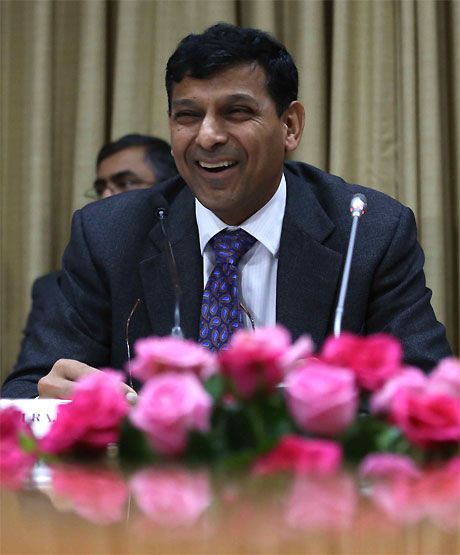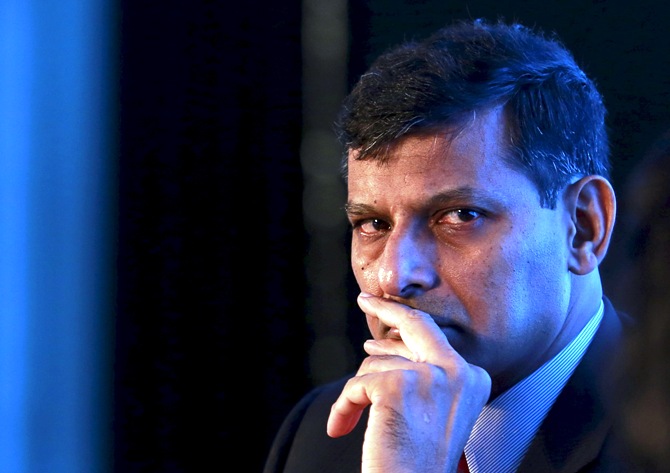RBI Governor Raghuram Rajan is regarded as credible by global financiers, says A V Rajwade.

As Raghuram Rajan's first term as Reserve Bank of India (RBI) governor comes to an end in a few months, are some of his recent comments sounding a little nostalgic?
Consider his remarks in London, as reported by Business Standard last Saturday:
"There is a lot of fulfilment making things actually happen for improving the environment... I have enjoyed every moment of the job."
"I think we have accomplished a lot."
Nostalgia is, by definition, about the past: Is he hinting that he is unlikely to accept a second term?
On the other hand, some weighty voices are arguing that he should continue for a second term: Christopher Wood of CLSA, a global fund manager, recently warned (The Economic Times, May 7) that "the biggest risk to the Indian bond and currency market will be if Raghuram Rajan is not given a second term"; sometime back, Swaminathan Aiyar asked the finance minister (Financial Times, February 26) to "do everything it takes to persuade him to stay for a second term. Mr Rajan is regarded as credible by global financiers".
Respondents of a recent survey by ETMartets.com overwhelmingly voted for Rajan to get a second term.
Have the policies on interest and exchange rates become so personalised that there is no "institutional view" on these issues?
This apart, let us review Rajan's record since he became governor.
The start was less than auspicious, with the "taper tantrum" leading to a sharp depreciation of the rupee (to Rs 68+ per $), on worries that higher interest rates in the US would lead to a portfolio capital flight from India.
Rajan took prompt measures to increase dollar supplies and restore confidence in the rupee, which appreciated to around Rs 62 per dollar.
Full marks to him for the way that particular situation was controlled and not allowed to reverberate into a "feedback loop".
Six months later, he changed the measure of inflation to be targeted by monetary policy from the Wholesale Price Index (WPI) to the Consumer Price Index (CPI); he also managed to get Delhi's consent to inflation targeting as the only macroeconomic objective of the RBI. Recently, he was given the casting vote in the monetary policy committee: since the six-member committee has three representatives of the central bank, the casting vote gives him supreme power, except in the extremely unlikely situation of an RBI executive going against the governor's wishes.
I have serious reservations about the wisdom of a single-point agenda like inflation targeting: Even the US Federal Reserve has two objectives - price stability and employment creation.
In many ways, our first macroeconomic priority needs to be job creation, with around 12 million Indians entering the job market each year; the actual performance has been very poor over the last couple of years.
As Deepak Nayyar, former chief economic advisor, government of India, wrote in a recent article (Mint, May 13): "Jobless growth is neither an accident nor a coincidence. It is the outcome of policies. Macroeconomic policies sought to focus on stability, defined in terms of prices rather than output or employment, so that managing inflation and balancing budgets became the essential objectives."
Another former chief economic advisor, Kaushik Basu, in his recent book has argued that there has hardly been any negative correlation between inflation and interest rates.
What is undeniable, of course, is the sharp increase in the non-performing assets of the banking industry.
In a recent submission to a parliamentary panel, the RBI governor put the blame on "economic downturn".
However, it is debatable whether 7.5 per cent gross domestic product growth can be characterised as "downturn".
Elsewhere (a recent Project Syndicate article), he has argued that "using some 'out-of-court resolution' mechanisms devised by RBI, and with capital support from the government, banks should have well-provisioned balance sheets by March 2017".
The recent bankruptcy law may also help.
But the question is how many businesses have adequate return on capital employed to afford double-digit "real" interest rates, given that, for the manufacturing/business sector's economics the WPI is far more relevant than the CPI; the gap between the two has been widening since the second half of fiscal 2014-15.
As of now, while the CPI is between five and six per cent, the WPI is practically zero; hence the double-digit real interest rates for too many borrowers.
Is there a conflict between the single-point agenda and the RBI's role as banking supervisor?
More on this and other connected issues in a later article.
The author is chairman, A V Rajwade & Co Pvt Ltd.











